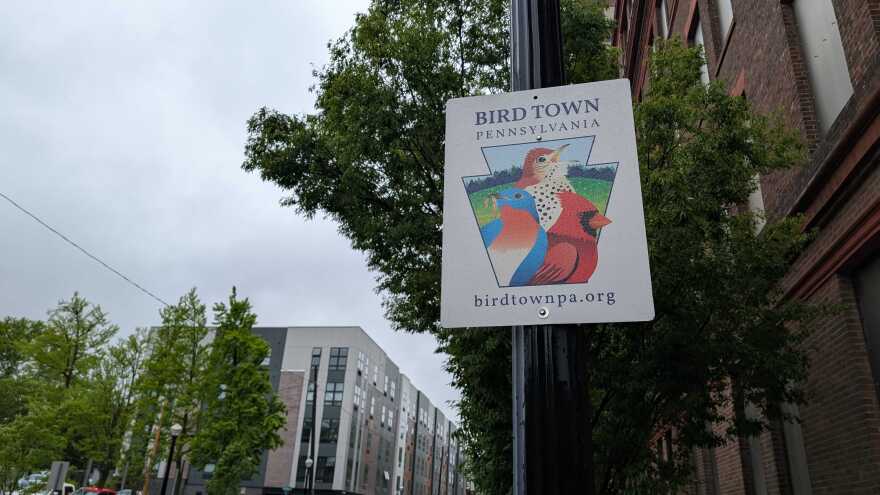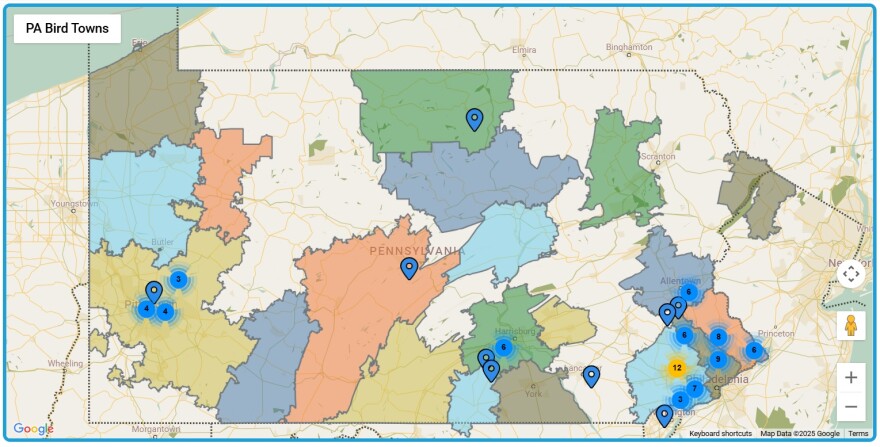BETHLEHEM, Pa. — Working as a sustainability consultant, Vibhor Kumar is familiar with certifications — and how they can act as a tool to drive change.
“I feel like the certification programs, of all sorts, their motivation is to have cities, companies start intentionally thinking about what more they can do,” said Kumar, who also is a member of the city’s Environment Advisory Council.
“I handle the reporting for Bird Town, and a lot of the work that happens is already organically happening throughout the city.
"But at the same time, you do see all these other opportunities where we are not getting scores — that is a motivation for us to do more.”
EAC members in both Bethlehem and Allentown have achieved gold status through Bird Town Pennsylvania.
“What's good for birds is good for people, too.”Heidi Shiver, president of Bird Town Pennsylvania
An annual certification focused on community-based conservation, the program aims to create a healthier, more sustainable environment for birds, as well as other wildlife and residents.
“We work at the municipal level, working with municipal leaders to address the threats to birds, because of the populations really continuing to decline across all species,” Bird Town Pennsylvania President Heidi Shiver said.
“Really trying to work with municipal leaders to let them know about that, and using that information to engage with them and educate their residents about what they can be doing to support birds.
"Like I always say, we're not just about birds — we're really about healthier habitats. What's good for birds is good for people, too.”
‘Everyone works at their own pace’
Starting the process to become a Bird Town is relatively simple. After contacting Bird Town Pennsylvania for an application toolkit, municipal officials have five steps to complete.
They are scheduling a meeting to discuss the process, creating a Bird Town Committee, passing a Bird Town municipal resolution, completing the application and paying a one-time $100 fee.
The application fee helps offset costs for Bird Town street signs, Shiver said. Once approved, municipalities get two, each costing $60.

“Some municipalities act very quickly on it — sometimes it takes a year,” Shiver said.
“It really is just informing them about the program, educating their commissioners or supervisors or councils about the process and what it's about, getting them on board and then moving forward.”
Each year, municipal officials — oftentimes through an EAC — will check off projects and tasks from the program’s Goal and Activity Worksheet.
Depending on how many are completed, points are calculated to determine an annual designation.
“It's a four-tier program,” Shiver said. “They come in at the green level, but we really want them to move up to bronze, silver or gold within the first year.
“We're checking in with them, making sure they know what to do, guiding them on things that they can be doing to help them along.
"We understand there's only so many volunteers and so much funding, so everyone works at their own pace.”
‘Valuable opportunities to network’
Allentown in 2011 was the first city in the Lehigh Valley to become a Bird Town, said Tinku Khanwalkar, co-chairwoman of the city’s EAC.
“As the first city in the Lehigh Valley to become a Bird Town, Allentown is pleased to see its numerous community-based stewardship programs recognized by Bird Town PA,” Khanwalkar said in an email.
“The city does not yet have systems in place to capture all data on community-based environmental actions, but even the limited data shows that in 2024 the city had at least 815 volunteer hours, 118 participants, managed 1,500 acres of park lands and planted at least 300 trees.”
Notable projects included a monthly environmental education workshop for children at the Allentown Public Library and installing an education banner on bird strikes at Muhlenberg College’s Fahy Commons for Public Engagement, among others.
The goals of the program align well with the EAC’s mission to promote community-based environmental programs, Khanwalkar said.
“Bird Town provides valuable opportunities to network with other municipalities in promoting such programs,” she said.
“In fact, shortly after Allentown became a Bird Town, the Allentown EAC spear-headed an effort to create an informal network of other municipalities and organizations [called the Lehigh Valley Bird Town Coalition] with a shared goal of promoting municipal environmental stewardship.”
The Lehigh Valley Bird Town Coalition posts activities on Meetup, an online event platform.
‘The program is doing great’
The Bird Town program has been active in the commonwealth for more than a decade.
Upper Moreland Township, Montgomery County, in 2011 was designated the commonwealth’s first Bird Town. Others, such as Allentown, soon followed.
While the program first was administered through Audubon Pennsylvania, that changed several years ago.
“The [Pennsylvania] office merged with a number of other states, becoming the Audubon Mid-Atlantic regional office, and at that time, they decided to no longer support the program,” Shiver said.
“That's about four or five years ago, just because of funding and staffing.”
At the time, Shiver was a member of the Doylestown Township EAC — she's now chairwoman — as well as Bird Town coordinator for the township and president of Bucks County Audubon.
“I just felt really passionate about the program,” Shiver said. “I really didn't want it to fall to pieces — I think there's a lot of great things that come from this program.
“So I took it upon myself to reach out to some other folks that I thought would be really good board members, potentially. We started as a working group, and then eventually evolved to be a board to make it more sustainable.
“And, here we are, a few years later, and the program is doing great.”
Currently, there are 83 Bird Town programs in 15 counties across the commonwealth.

In the Lehigh Valley, there are five Bird Towns. In addition to Allentown and Bethlehem, others are Lower Macungie, Whitehall Township and Salisbury Township.
All have achieved gold status this year, except for Salisbury, which achieved bronze.
‘More and more Bird Towns’
Kumar got involved with the Bird Town annual reporting for Bethlehem’s EAC a couple years ago, but the city got involved in the program in 2015.
“Every year I see more and more Bird Towns,” he said.
“They do have this annual presentation, like a meeting, where they announce all the new Bird Towns that joined and that's also when they provide the different certifications to different Bird Towns.
“It’s very exciting to see this program grow over the past few years.”
After looking at the goals and activities outlined in the worksheet, EAC members realized they already were completing projects needed to achieve Bird Town status, he said.
“I think the motivation was more of that — we are already doing all of this stuff,” Kumar said. “It'll be nice to get certified for it.
“Even if it started organically, that we were already doing these things, these certifications do help motivate us to do more and maintain some of these certifications, and hopefully Bethlehem will always be a gold-certified Bird Town.
"If we see that you're not meeting that certification, it motivates us to do more.”
To Kumar, the program really focuses on conservation, but also on communicating those projects with residents. The latter, he said, is “a big aspect that I feel like we haven't fully explored.”
“That communication could be through schools, through libraries,” he said. “And generally, as part of the Climate Action Plan for the city of Bethlehem, that community engagement is a big aspect.
“And this fits really well into that goal and program, and something I would love to explore is maybe some more programming with the library where people who are knowledgeable about this stuff can come and speak.”
Editor’s Note: Tinku Khanwalkar, who is quoted in this report as co-chair of the Allentown Environmental Advisory Council, also serves on the board of directors of Lehigh Valley Public Media, the parent organization of LehighValleyNews.com. Her involvement with the board had no influence on the reporting or editorial decisions related to this story.


